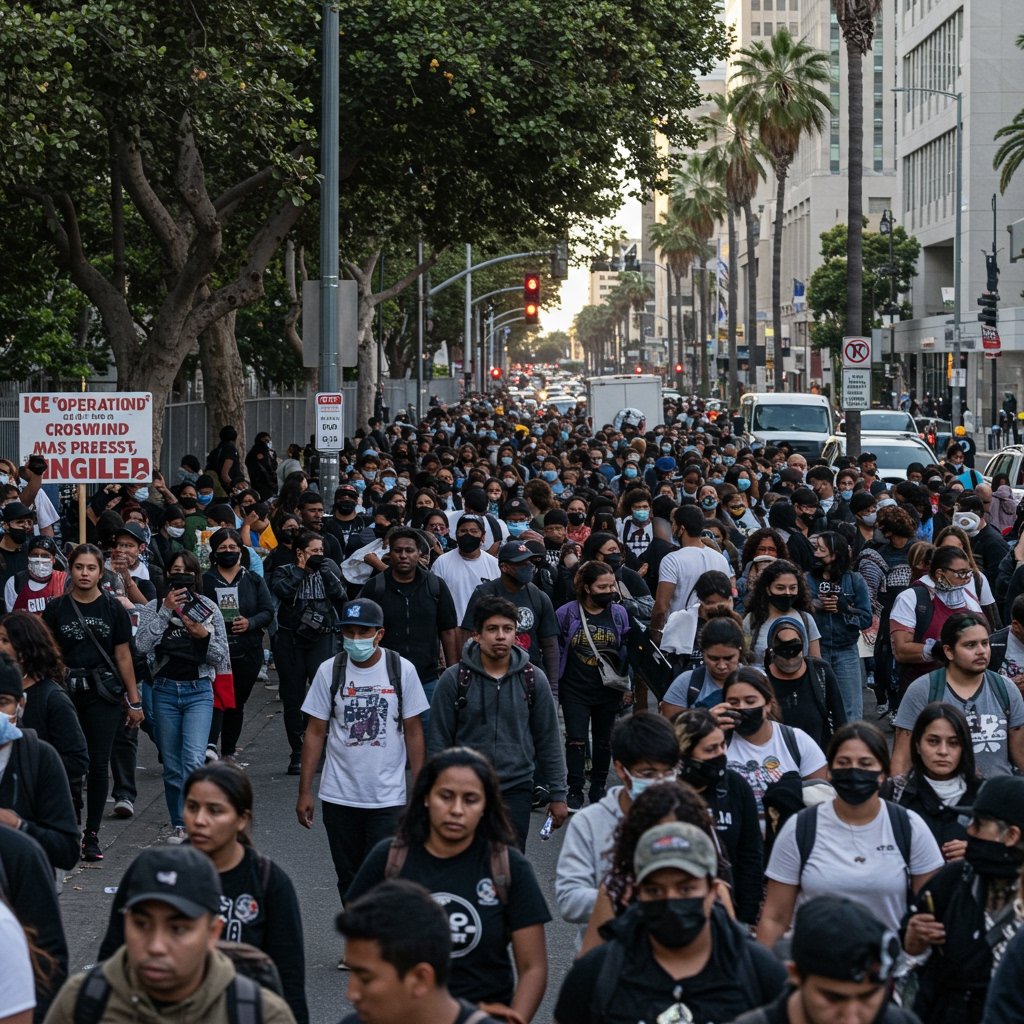Los Angeles, CA – Demonstrations erupted across Los Angeles this week following a targeted enforcement action by U.S. Immigration and Customs Enforcement (ICE) dubbed \”Operation Crosswind.\” The operation, conducted on May 30, 2025, led to the apprehension of 45 individuals, primarily within the Pacoima and East Los Angeles neighborhoods. The subsequent protests, mobilizing hundreds and converging near the downtown Federal Building on June 1st and 2nd, highlighted intense community opposition, particularly directed at ICE’s focus under the specified DHS Enforcement Priority Directive 2025-B. The rising tensions culminated in clashes with the Los Angeles Police Department (LAPD) on June 2nd, resulting in several arrests, as immigrant advocacy groups announced they had filed a federal lawsuit challenging the directive’s legality.
The Scope of Operation Crosswind
U.S. Immigration and Customs Enforcement confirmed that \”Operation Crosswind,\” executed on Friday, May 30, 2025, involved the apprehension of 45 individuals across the Los Angeles metropolitan area. Agency officials stated that the operation concentrated enforcement efforts in specific communities, identifying Pacoima and East Los Angeles as primary areas impacted by the actions. According to ICE, the individuals targeted were apprehended pursuant to criteria outlined in the Department of Homeland Security’s (DHS) Enforcement Priority Directive 2025-B. While the specific details of Directive 2025-B’s criteria were not immediately elaborated upon by ICE in public statements following the operation, advocacy groups were quick to criticize the directive’s perceived impact on local communities.
Protests Mobilize Across Los Angeles
In response to the enforcement actions, hundreds of demonstrators took to the streets of Los Angeles over the weekend. On Saturday, June 1st, and Sunday, June 2nd, protesters organized by groups including the LA Immigrant Justice Alliance, converged near the Federal Building downtown. The demonstrations drew significant attention, with participants voicing strong opposition to \”Operation Crosswind\” and the underlying enforcement priorities specified by DHS Enforcement Priority Directive 2025-B. Organizers stated their concerns centered on the broad scope of the directive and its effects on immigrant communities within the city. The atmosphere remained largely peaceful on June 1st, but tensions rose significantly the following day.
Clashes with Police and Arrests
Sunday, June 2nd, saw the protests near the Federal Building take a volatile turn. Confrontations between some demonstrators and officers from the Los Angeles Police Department escalated. Reports indicated instances of property damage and disruptions, leading LAPD officers to intervene. The clashes resulted in the arrest of 12 individuals. Authorities stated that the charges against those arrested included, but were not limited to, vandalism and unlawful assembly. The confrontations underscored the depth of frustration and anger felt by some participants regarding the federal immigration enforcement actions.
Legal Challenge Launched Against DHS Directive
Amidst the escalating street protests, the LA Immigrant Justice Alliance announced a significant legal challenge. The advocacy group confirmed it has filed a lawsuit in the U.S. District Court for the Central District of California. The case, officially docketed as Case No. CV 25-04123, names the Department of Homeland Security (DHS) and potentially other federal entities as defendants. The lawsuit directly challenges the legality of DHS Enforcement Priority Directive 2025-B, the same directive cited by ICE in conducting \”Operation Crosswind.\” The LA Immigrant Justice Alliance is seeking judicial intervention, including a temporary restraining order, to halt further enforcement actions based on the contested directive while the legal merits of the case are considered by the court. The filing of the lawsuit signals a shift from street demonstrations to a formal legal battle challenging the administration’s immigration enforcement policies.
The Contested Directive 2025-B
The heart of both the protests and the lawsuit lies in DHS Enforcement Priority Directive 2025-B. While the exact public text and specific criteria of this directive have not been extensively detailed in the immediate aftermath of \”Operation Crosswind,\” its reference by ICE as the basis for apprehending 45 individuals, particularly those in Pacoima and East Los Angeles, has drawn sharp criticism from immigrant rights advocates. Advocacy groups contend that the directive casts too wide a net, potentially impacting individuals who do not represent significant public safety threats, contradicting stated federal priorities that often emphasize focusing on individuals with serious criminal records. The lawsuit filed by the LA Immigrant Justice Alliance aims to compel a legal review of whether Directive 2025-B exceeds the statutory authority of the Department of Homeland Security or violates constitutional protections.
The events unfolding in Los Angeles – from the targeted ICE \”Operation Crosswind\” and subsequent arrests to large-scale protests culminating in clashes and a significant federal lawsuit – highlight the intense and ongoing national debate surrounding immigration enforcement policies. The legal challenge to DHS Enforcement Priority Directive 2025-B, now before the U.S. District Court for the Central District of California under Case No. CV 25-04123, represents a crucial phase in this dispute, potentially impacting future enforcement actions and the lives of countless individuals within immigrant communities. As the court proceedings begin and community tensions remain high, Los Angeles finds itself at the forefront of the complex intersection of federal immigration policy, civil rights advocacy, and public safety concerns.





